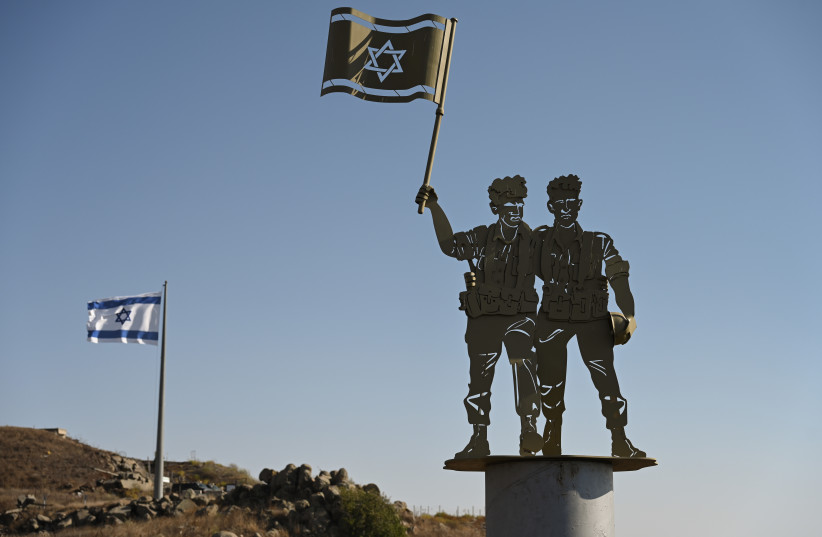Riding the roller coaster of emotions since October 7, one risks encountering triggers to the similar trauma of the catastrophic events of that other October of 50 years before. That, too, was no picnic.
Egypt and Syria surprised us then with the undetected threat of imminent destruction by national armies; Hamas surprised us 100-some days ago with ignored threats of destruction by civilian massacre. A state commission of inquiry dealt with the intelligence failures preceding the Yom Kippur War of 1973, while a commission of inquiry into the intelligence failures that led to the war against Hamas awaits the conclusion of hostilities.
So, the fighting goes on, and will continue until the end, which the government declares must be the eradication of Hamas. With all the hostages freed. Without a two-state solution. Without the Palestinian Authority ruling Gaza.
Among the many emotional triggers constantly being pulled by present events are what followed the Yom Kippur War: the entire country traumatized for what seemed an entire year, the nation overwhelmed by depression amid life-changing events.
In 1973, I was in graduate school in philosophy at The Hebrew University. I spent the war as a volunteer in an Air Force unit servicing drones used to decoy enemy anti-aircraft missiles. I got the 24/7 job due to the coincidence of being able to read the thick texts of a US Air Force manual. (More of this period is featured in my novel, see below).

When the universities reopened after the 1974 disengagement agreement with Syria finally ending the war, I no longer could sit in the now mainly deserted philosophy library working on my thesis, as if Hermann Cohen and Martin Buber hadn’t just lived through a war with me. I needed a vocation more grounded in reality, so I returned to my youthful preoccupation and became a journalist, first as a freelancer and then some 40 years at The Jerusalem Post.
Back to the future
Amid a new war, the triggers remind me of that time, some 50 years ago, when the woman I courted then throughout the war became my wife. I say “courted” in the traditional sense, but the term in the language of the 1970s meant living together.
This eventually paid off with four children who became IDF veterans and parents, along with their father, although I am much too old to serve in the reserves anymore. That leaves plenty of time to serve as a grandfather at war, and in some surprising ways.
I’m equally proud of all my children. Militarily, they all outrank me, especially my three daughters (a major in combat infantry; assistant chief of staff in Naval Intelligence; staff sergeant in the Education Corps). Their brother was a combat medic in the Paratroopers Brigade. I retired as a corporal in the Home Front Command.
They were pursuing various successful careers when October 7 dawned and changed the entire nation’s lives. Being equally proud of my children is one thing, but being especially equally proud is an exceptional category: giving life during wartime.
The award goes to one of our daughters, a nurse in oncology and mother of four, who decided with her husband and children to help create another Jewish family by carrying a surrogate pregnancy for a woman who could not conceive.
Naturally, the project was enthusiastically adopted by all involved: the expectant surrogate volunteer, husband and children – especially my grandson, whose three sisters prompted him to spiritually adopt the growing fetus as his baby brother.
But that was nothing like the anticipation of the new parents-to-be, who grew to become close friends throughout the pregnancy – which began before October 7.
Surrogacy is one thing, a super mitzvah, but this was war. My daughter, a senior nurse, worked full time until she joyously gave birth, giving life in the midst of war. It wasn’t without benefits, however. As a surrogate, she handed over her newborn son to his beaming new mother and father on the delivery table.
A moment of tears of joy all around. Then the practical nurse smiled with the realization that she would never have to change the kid’s diapers.
New year’s bonus
While giving life and creating a Jewish family are definitely super-mitzvahs, they are actually part of a set of direct commandments: Be fruitful and multiply.
While especially proud of my gestating daughter, I don’t think her accomplishment makes me a surrogate grandfather. Thankfully, I have been blessed with the status of saba (grandfather) for nearly 13 years, with our first bar mitzvah coming up in April.
But just as we were anticipating the surrogate child’s arrival, we were also all participating in the nine-month countdown to the arrival of our own grandchild, number 13, grandson Neriah, a month ago. Two new lives in the midst of war.■
The writer is a former chief copy editor and editorial writer at The Jerusalem Post. His debut novel, The Flying Blue Meanies, is available on Amazon.
